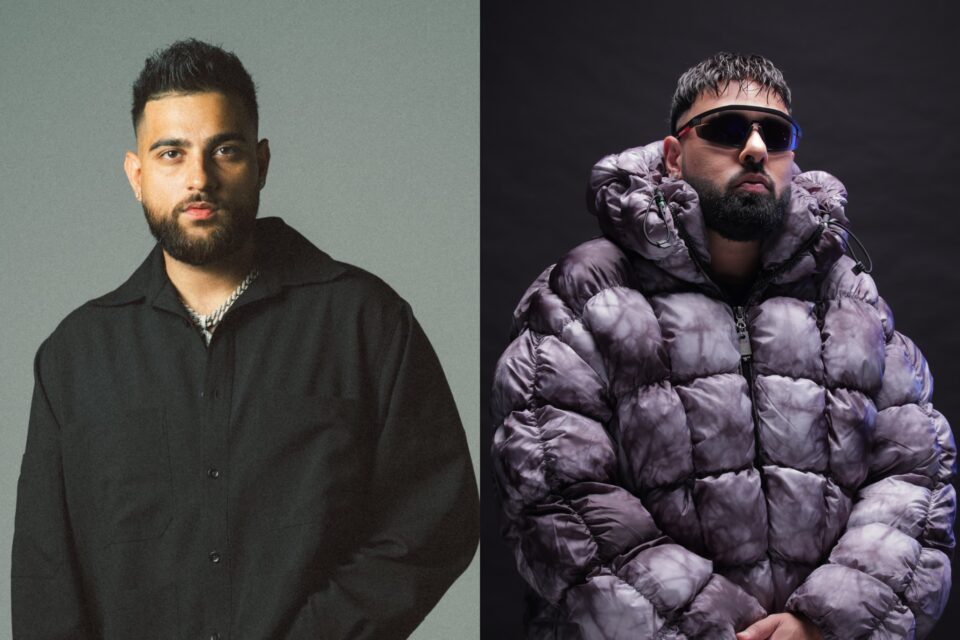Badshah and Karan Aujla Look Back at Their Spotify Wrapped Stats
In terms of most streamed artists in India, Aujla took 11th place, followed by Diljit Dosanjh at 14 and Badshah on the 22nd spot

Karan Aujla and Badshah are among the top streamed Punjabi artists on Spotify in India in 2024. Photos: Courtesy of the artists
In a true reflection of how some of the most in-demand artists touring India right now are also among the top-streamed in the country, Spotify India’s Wrapped stats for 2024 revealed a wider story of Punjabi artists like the late Karan Aujla (#11), Diljit Dosanjh (#14), Sidhu Moose Wala (#21), Badshah (#22) and Shubh (#24) among the 25 most streamed artists in India.
While it’s unclear what positions these artists held in recent years’ top 25 most streamed artists, we do know that Moose Wala was at number nine in 2023 and his album Moosetape was the most streamed full-length of 2022. Although AP Dhillon was the sixth-most streamed artist on Spotify in India in 2022, he’s mostly missing in action this year – although he can still pack the house for his recent shows on the back of releasing The Brownprint EP.
When it comes to the most-streamed songs in India on Spotify, however, Shubh’s “One Love,” “Cheques” and “King Shit” rank at number 10, 17 and 25 respectively, while Karan Aujla and Ikky’s “Softly” comes at number 12 and Aujla’s movie song “Tauba Tauba” for Bad Newz took the 23rd spot. As we noted earlier about Indian hip-hop in 2024, collabs always pop off – Diljit Dosanjh and Badshah’s “Naina” (with composer-lyricist Raj Ranjodh) for the movie Crew landed at number 16 among most-streamed songs, while Badshah’s “Soulmate” with Arijit Singh took the 20th spot.
Among albums, Punjabi artists took up plenty of space, from Aujla’s Making Memories at number 4, Shubh’s Still Rollin at number 7, Badshah’s Ek Tha Raja at number 8, Moose Wala’s Moosetape still reigning at number 9, Dosanjh’s Ghost at number 12 and G.O.A.T. at number 23.
In an email interview with Rolling Stone India, Aujla and Badshah shared their excitement about charting high at Spotify India’s end-of-year “report card.” Here’s what they had to say.
Rolling Stone India: You’ve reached a new level of stardom this year in India. What did you feel you did differently (if anything) to reach these many listeners?
Karan Aujla: This year, I focused on being authentic and tried blending traditional elements with modern sounds. The storytelling through my lyrics reflected the emotions and experiences that all groups can resonate with. I collaborated with other pan-India artists and producers, which helped my music reach new listeners across the country.
Badshah: I didn’t do anything differently; I just made music. With Ek Tha Raja, I had the opportunity to collaborate with a lot of artists, which allowed me to tap into their listener base. That probably helped me, but aside from that, I think it’s just the music speaking for itself. Collaborating with Arijit (Singh) dada introduced me to a different fanbase while working with artists like Divine and Seedhe Maut helped me connect with even more diverse audiences.
As an artist, when you look up your Wrapped stats, what are the first emotions that come up, seeing those kinds of numbers for your music?
Aujla: It’s humbling. I feel immense gratitude to everyone who listens to my music and connects with it on such a deep level. Seeing those numbers isn’t just about stats — it’s about realizing how far my music has traveled and the lives it’s touched. I thank my parents for everything and would like to believe they are proud of the person that I am today.
Badshah: As an artist, when I look at my rap style, I was, of course, thrilled to hit the billion-stream mark. It was exciting and incredibly rewarding to reach that milestone. Beyond that, seeing the sheer number of listeners enjoying my music is always motivating. A billion streams is a huge achievement, but I hope to get twice as many this year.
As Punjabi music went more global, it also became even more popular in India, what are your thoughts on this?
Aujla: Absolutely, Punjabi music has gone global, but its heart remains deeply rooted in our culture as we take immense pride in it. Globally, people are dancing to bhangra beats, vibing to folk instruments, and singing along to Punjabi lyrics, which makes Indian audiences celebrate their roots even louder. This international spotlight has also encouraged artists to experiment more and elevate the genre, making it stronger than ever in India.
Badshah: Punjabi music was always global. Ever since the Westernization of Punjabi music began, we’ve been reaching global audiences, because we were trying to amalgamate our music with theirs. This fusion makes the music more accessible globally. At the same time, anything considered cool abroad tends to become cool in India too, and that trend has worked in favor of our music.
Which song of yours do you think needs to get more love on Spotify?
Aujla: That’s a tough one but if I had to pick, I’d say “IDK How.” It’s a track that has a unique vibe, but I think it flew under the radar compared to my more commercial hits. I’d love for listeners to rediscover it.
Badshah: I think my album The Power of Dreams of a Kid deserves more love. It’s one of those underrated albums that came out in 2018 and didn’t get the recognition it deserved. Even now, when I check streaming platforms like YouTube, I see comments like, ‘this is such an underrated album.’ It’s filled with hidden gems. I really believe both this album and Ek Tha Raja should be heard more on platforms like Spotify.







